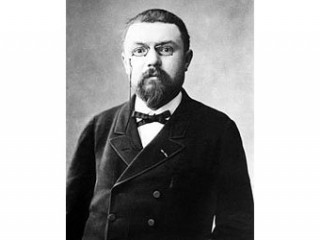
Henri Poincaré biography
Date of birth : 1854-04-29
Date of death : 1912-07-17
Birthplace : Nancy, France
Nationality : French
Category : Historian personalities
Last modified : 2011-08-24
Credited as : Mathematician, combinatorial topology,
The French mathematician Jules Henri Poincaré initiated modern combinatorial topology and made lasting contributions to mathematical analysis, celestial mechanics, and the philosophy of science.
Henri Poincaré was born at Nancy on April 29, 1854. His father was a physician. Henri attended elementary school and the lycée in Nancy and entered the école Polytechnique in Paris at the age of 18. There he demonstrated his brilliance in mathematics and also his phenomenal memory. Although his eyesight was poor, he never took notes in class, and after reading a book he could recall the page on which any statement occurred.
Strangely enough, at this time Poincaré seems not to have fathomed his own mathematical power, for in 1875 he entered the School of Mines with the intention of becoming an engineer. But 3 years later he qualified as a mining engineer and earned his doctorate of mathematical sciences with a thesis based on a difficult problem in differential equations. On the strength of this and other papers, he was appointed professor of mathematical analysis at Caen in 1879. Two years later he obtained a position at the University of Paris, and in 1886 he was made a professor there.
Poincaré's scientific output was prodigious and amazingly comprehensive. The generality and originality of his methods enabled him to master and then break new ground in mathematical physics, celestial mechanics, and nearly every branch of pure mathematics. It was Poincaré's style to emphasize qualitative solutions rather than quantitative recipes. He published several papers on the behavior of solutions and on the properties of integral curves. In 1895 he published Lecons sur le calcul des probabilités (Lessons on the Calculus of Probabilities). He was led to the study of the behavior of divergent and convergent series through his work in celestial mechanics. This led to further investigations of quadratic forms, integral invariants, and double intervals of periodic orbits. He also was actively involved in work on electromagnetic theory.
In 1906 Poincaré published a more general work, La Science et I'hypothese (Science and Hypothesis), propounding a relativistic philosophy. In philosophy he advocated a variety of pragmatism which he called "conventionalism." "One does not ask, " he said, "whether a scientific theory is true, but only whether it is convenient." He thought that mathematical logic was barren, and when he heard that antinomies had crept into the logistic system of Bertrand Russell and Alfred North Whitehead he could barely conceal his glee. "Logistic is no longer barren, " he wrote, "it engenders antinomies."
Poincaré was elected to the Academy of Sciences in 1887, and he became president of that body in 1906. Two years later he was elected to the literary section of the French Institute, in recognition of his popular works on the philosophy and methods of science, which were widely read in France and translated into six languages. He was appointed a member of the Académie Francaise in 1909 and elected a foreign member of the Royal Society in 1894. Poincaré died in Paris on July 17, 1912.
















